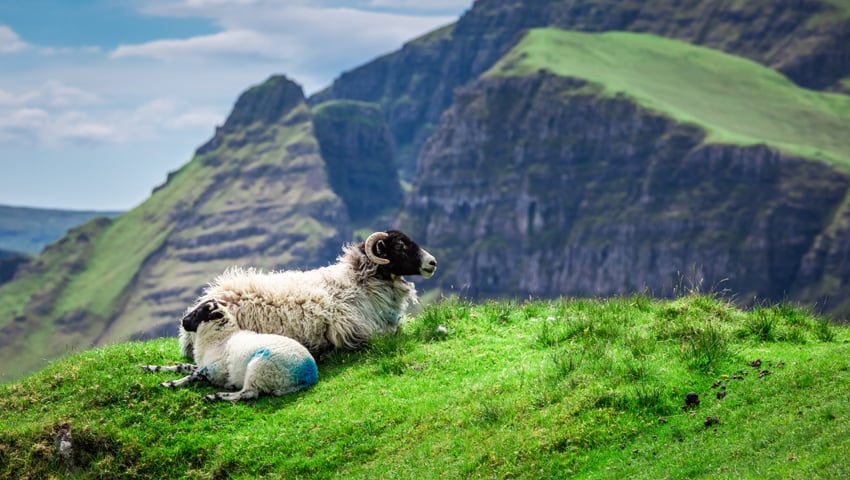A report produced by Scotland’s Rural College (SRUC) has highlighted the unique role agriculture plays in island life and calls on government to use this new evidence in policy decisions.
‘Rural and Agricultural Development: Maximising the potential in the islands of Orkney, Shetland and Outer Hebrides’ offers new analysis of Scottish Government data, and details insights from farmers and crofters, agricultural supply chain businesses, communities and stakeholders.
The research found that, in their current form, future policy proposals present some risks for some island economies, environments, and communities.
The study also confirmed that agriculture accounts for a higher share of private businesses, turnover and employment, as well as the proportion of total adult population, in these communities compared to other local authorities in Scotland, and that there are differences both within and between the island groups.
In this context, it identifies that islands agriculture faces some unique challenges:
- Agriculture has important local multiplier effects on island economies, along local supply-chains and into the wider rural economy. Moreover, farming and crofting are important aspects of local culture.
- The Island areas contain a high proportion of nationally and internationally important habitats, species and peatlands reflecting the unique interaction between land management and nature. A prosperous farming and crofting sector matters economically, environmentally and socially.
- The agricultural sector across all three island groups is constrained by several critical factors, including: the unreliability and higher costs of haulage of inputs to and selling outputs from islands; uncertainty over future provision of ferry services; an ageing and shrinking workforce: and inflation impacts that have eroded the government’s financial support for farmers and crofters.
- There has been long term consolidation of the number of farms and crofts receiving agricultural support across the three island areas, with some localised declines in agricultural activity, most notably the decline in sheep production in the Outer Hebrides. Complexity and compliance costs of policy proposals may lead to further withdrawal from support structures and activity, particularly for small scale producers.
- Practical and policy solutions need to be found to retain agricultural and environmental activity in respect of crofting and common grazings, particularly in Shetland and the Outer Hebrides.
- Evidence on the impacts of peripherality and distance from markets must be embedded in future support schemes such as evolutions of, for example, the Less Favoured Area Support Scheme (LFASS) & the Scottish Suckler Beef Support Scheme (Island Calf Scheme).
- The report findings indicate that a thorough Islands Community Impact Assessment (ICIA) is likely to be needed in relation to the combined effects of different strands of future agricultural policy interventions, and the delivery of the ‘Rural Support Plan’. Future ICIAs should be place-based and should take into account differences within island groups, acknowledging the additional costs of e.g. transporting goods to outer isles.
- Community Led Local Development (CLLD) has a critical role to play in sustaining island communities, particularly by sharing solutions and experience across island groups. This is amplified by the low business base meaning that community solutions are all the more important to overcome challenges. The current allocative model for funds from Scottish Government places limits on capacity building and leads to uncertainty for paid staff and volunteers. A return to multi-annual funding is needed.
Funded by the Scottish Government’s Community Led Local Development Collaboration Fund, as part of the Scottish Rural Development Programme, the project was commissioned by the Orkney, Shetland and Outer Hebrides Local Action Groups in collaboration with Orkney Islands Council, Shetland Islands Council, Comhairle nan Eilean Siar and Highlands and Islands Enterprise.
The work coincided with the progress of the Agriculture and Rural Communities Bill through the Scottish Parliament. The findings have been welcomed by Councils in Orkney, Shetland and the Western Isles.
Speaking on behalf of the three island areas, Orkney Islands Council’s Leader Heather Woodbridge said, “We welcome the publication of this research from SRUC that highlights the critical role the agriculture sector plays in our island communities.
“The report demonstrates clearly that our agricultural sector is woven into the fabric of our communities and the role it plays in managing the environment of our beautiful islands. I would urge the Scottish Government to factor this report into their evidence-based policy making approach when forming the Rural Support Plan, Rural Delivery Plan and National Islands Plan, as well as other secondary legislation accompanying the Agriculture and Rural Communities Bill.
“What is abundantly clear, is that our farmers are proud of the very important role that they play in our communities and that with appropriate policy and other support, agriculture can contribute to buoyant island economies and strong island communities.”
Rural Affairs Secretary Mairi Gougeon said, “I welcome this important report. Evidence based policy making is crucial to addressing the unique challenges and opportunities faced by our island communities.
“This report offers valuable insights that will help us to make informed decisions around how we continue to support the sustainable development of our islands.”
